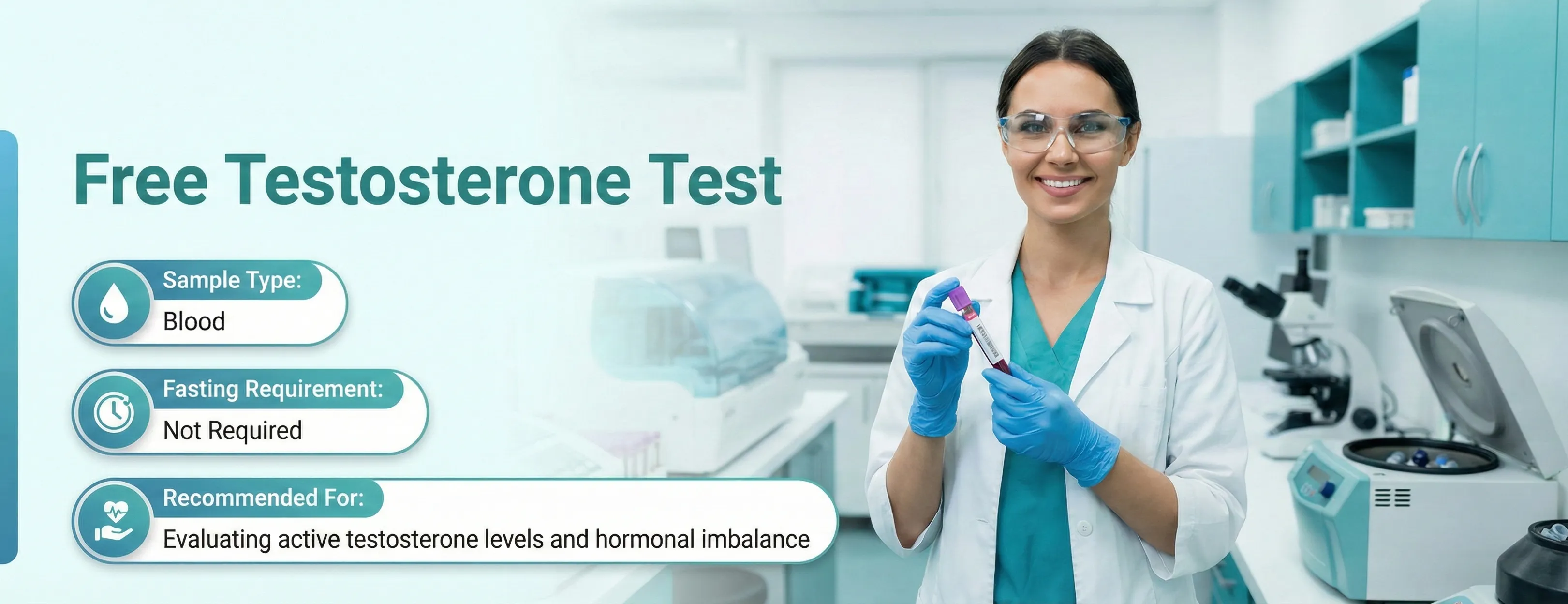351+ orders placed in your location
100% NABL & ISO Certified Lab • 100% Accurate Reports
Free Testosterone Test
Bioavailable Testosterone Test, Serum Testosterone, Total Testosterone, Free Testosterone
- SummaryThe Free Testosterone test measures the level of testosterone that is not bound to proteins in the blood and is available for use by the body. It helps evaluate male and female fertility, sexual function, and hormonal imbalances. This test is done using a blood sample, and fasting is usually recommended, especially if done alongside other hormone tests.Read more
- Reports Within23 HrsView Sample Report100% NABL & ISO Certified Labs
- SampleBlood
- AgeAll Age Group
- GenderMale and Female
- FastingNot Required
PharmEasy Promises
Know More About The Test
A quick info on Free Testosterone Test
Overview
Testosterone, a sex hormone, plays an important role in both men and women. In men, it regulates sex drive, bone mass, muscle mass, and production of sperm. Women also make testosterone but in a small amount. They produce testosterone in their ovaries that maintains hormone balance and other body functions.
During puberty, testosterone is produced in large amounts in the male, which regulates secondary sexual characteristics like the development of muscle, body hair growth, deepening of the voice, and enlargement of the penis and sperm productions in testes.
In adult males, testosterone plays an important role in regulating the sex drive and maintaining muscle mass. In adult females, testosterone is converted to estradiol, the main sex hormone.
This testosterone in the blood attaches to two proteins named albumin and sex hormone-binding globulin. But some of the testosterone is freely present in the body and not attached to proteins. This is named Free testosterone that is easily used by the body.
This Free Testosterone blood test measures the amount of unattached free testosterone in your blood. The high or low of free testosterone in both men and women has a health problem.
It is often unclear what exactly causes mild-to-moderate testosterone elevations in the blood. But the common causes of elevated testosterone are genetic conditions like congenital adrenal hyperplasia, tumours of reproductive organs like adrenal, testicular and ovarian tumours, and excessive use of testosterone supplements. In addition, testosterone production declines with age between the fourth and sixth decades of life.
In women, excess testosterone leads to hirsutism, acne, menstrual problems, and infertility as well. As testosterone levels decline, females may experience subtle symptoms like a decrease in libido or mood changes.
In men, low free testosterone can lead to partial or complete degrees of hypogonadism. It is characterized by changes in male secondary sexual characteristics and reproductive function. When testosterone levels are mild to moderate, they produce little or no symptoms in men, but they can cause distress in women.
So if your doctor thinks that the problem you are facing correlates with abnormalities in testosterone, then they recommend a Free Testosterone Test for more information.
Moreover, testosterone levels are diurnal in nature, meaning the level of testosterone changes two times in a day, the highest (peak) levels in the morning (about 4:00 to 8:00 am) and the lowest levels in the evening (about 4:00 to 8:00 pm). Testosterone levels also increase after exercise and decrease with age.
Sample Type
The Free testosterone test is performed on a blood sample. For Free Testosterone Testing, no fasting and no other special preparations are required.
Risk Assessment
Sexual disorders, Infertility, Hypogonadism
What does this test detect?
The Free-Testosterone Test measures the level of free testosterone (unbound testosterone) in the blood in both men and women. Your doctor recommends the free-testosterone test when an individual is suffering from a low sexual drive or suffering from any hormonal change symptoms.
Indications for Free Testosterone Test
Some of the common symptoms of abnormality in testosterone in men are:
- Low sexual drive
- Loss of muscle mass
- Erectile dysfunction
- Swollen breast
- Lack of energy, fatigability
- Testicular lesions
- Delayed or Early puberty in boys
- Trouble with concentration
- Hair loss, weak bone
In females, this test can help in finding the reason behind the missing periods and irregular periods. Some other symptoms of getting testosterone testing in women are-
- Excess body and facial hair growth
- Deepening of voice
- Menstrual irregularities
- Excessive oily skin
- Recurrent Acne
- Low sex drive
- Dryness in the vaginal region
- Enlarged clitoris
- Weight gain
Here are some disease conditions that show a variation in testosterone:
- Infertility
- Osteoporosis
- PCOS in women
- Congenital disease
- Tumours of the adrenal gland, testes, or ovaries
So if you are suffering from the above symptoms and diseases, you should check your free testosterone levels.
However, abnormal testosterone levels in the blood do not always indicate medical problems. In older age men and excessive exercise causes lower testosterone levels.
How frequently should you take this test?
Like most chronic conditions, testosterone low-level treatment takes time. Therefore, to monitor the level and to keep a check on the treatment plan, your doctor is most likely to repeat your test after 3 months.
This 3-month check-up will give a sign if the level is increased, lowered, or maintained.
However, if your free testosterone level was fine in a previous report, and you have not been taking any treatment, then your doctor will repeat this test annually.
Test Preparation
Before the Test
Generally, there's no need to prepare for a Free-Testosterone Test. However, if this blood test is done at the same time as another that needs certain preparation, your doctor might recommend avoiding certain foods, and may suggest performing the test in the morning because testosterone levels vary between the day and evening, and its values are usually higher in the morning.
Consult your doctor for advice for the best outcome.
During the Test
A tiny amount of your blood will be taken from a vein in your arm. Here are the things to expect during the procedure:
- The likely puncture site will be cleaned with an antiseptic solution.
- A band will be wrapped around your arm to make the veins more visible.
- A needle will be inserted into the vein to collect the blood. This might cause a quick pinch for a few seconds.
- The blood will be put into a vial/small tube, and with a label containing your information.
After the Test
After the blood is drawn:
- A bandage will be put on the puncture area to stop any bleeding.
- It's normal to have a little bit of bruising. A rare side effect could be feeling lightheaded. If you feel dizzy, sit down for a few minutes.
- If you notice any bleeding, pain, or a rash at the site of the needle, please get in touch with your doctor
Parameters
The Free Testosterone Test values give an idea about the decrease and increase in the level of free testosterone in the blood. In general, for adult men, a free-testosterone test is mostly recommended if there are symptoms of low testosterone, but for women, it is mostly prescribed if there are symptoms of high testosterone levels.
Ranges
The normal testosterone level for you depends on both your gender and age.
In males
0-9 years- Less than 1 pg/mL
10-11 years-Less than 4 pg/mL
12-13 years- Less than 68 pg/mL
14-15 years- 2-95 pg/mL
16-17 years- 26-119 pg/mL
18 years and older- 32-168 pg/mL
In females
0-9 years- Less than 1 pg/mL
10-11 years- Less than 3 pg/mL
12-13 years- Less than 5 pg/mL
14-15 years- Less than 6 pg/mL
16-17 years- Less than 7 pg/mL
18-30 years- 1-5 pg/mL
31-40 years- 1-6 pg/mL
41-50 years- 1-4 pg/mL
51 years and older- Less than 3 pg/mL
The normal values and reference ranges of the test may vary from lab to lab. Please refer to the ranges mentioned in the report and consult a doctor to understand the interpretation of lab reports.
Test Result Interpretation
Increased or decreased levels of Free Testosterone in the blood are responsible for various problems in males and females.
In males, abnormal levels of free testosterone are indicative of these conditions.
Decreased level of testosterone:
- Partial or Complete hypogonadism - It is a condition in which there is decreased functional activity of the gonads leading to a decrease in the production of hormones like testosterone, estradiol, progesterone, etc.
- Primary testicular failure - In this condition, the testes fail to produce sperm despite adequate hormonal support. It is associated with increased levels of luteinizing hormone (LH) and follicle-stimulating hormone (FSH) and decreased levels of free testosterone.
- Testicular cancer - A cancer of the testicle occurs at a young age and is highly curable. During the diagnosis and screening of testicular cancer, a low level of testosterone is seen as well.
Increased testosterone levels:
- In boys, increased levels of testosterone are seen in the pre-puberty stage, excessive supplements of testosterone are suspected for the high levels of testosterone. However, further workup is necessary to determine the cause of increased testosterone levels.
- In adult men, testicular or adrenal tumours or a history of orchiectomy or chemotherapy can present with a lower testosterone level.
In females, abnormal levels of free testosterone are indicative of these conditions.
Decreased testosterone levels may be observed:
- Primary or secondary ovarian failure - In this condition, the ovaries stop functioning normally and don't produce normal levels of oestrogen or testosterone, leading to a low level of testosterone in the body.
Increased testosterone levels may be seen in:
- Congenital adrenal hyperplasia - A genetic disorder affecting the adrenal glands. As a result of this condition, the adrenal glands increase testosterone production and produce ambiguous genitalia, such as an enlarged clitoris or genitals that look more like those of a male child.
- Prepubertal girls - The stage before puberty in females is analogous to males. At this stage, increased levels of testosterone are seen.
- Adrenal tumours - They are tumors on the adrenal glands. The hormones produced by the tumor are responsible for the symptoms of adrenal tumours. Their most common symptoms are excessive growth of facial and body hair (such as in the pubic and underarm areas), enlarged clitoris, etc, due to the increased level of testosterone produced by the tumour.
- Ovarian tumours - The cancerous growth of the ovaries can also affect the level of hormones secreted in the body leading to an increased level of testosterone in a female body.
- Polycystic ovarian syndrome - PCOS and hyperandrogenism go hand in hand. Elevated androgens are one of the three possible defining signs of the polycystic ovarian syndrome. The classic features of PCOS are hirsutism, acne, menstrual disturbances, insulin resistance, and, frequently, obesity. Total testosterone levels are elevated in this condition.
Risks and Limitations
The Free-Testosterone Test is a commonly done blood test with rare risks of complications. See your doctor if you notice:
- Persistent bleeding at the site of needle-insertion.
- The skin where the needle went in becomes red, swollen, or hurts.
Limitations of the test
- The accuracy of the test could be affected due to equipment or human mistakes.
- Misinterpretation of the markers leading to inaccurate reports.
Was This Test Information Helpful?
Please rate your experience
References
People Also Ask
Does masturbating reduce testosterone?
What is normal testosterone by age?
Is 400 a good testosterone level?
How can I test my testosterone levels at home?
How do you fix low testosterone?
Have any doubts? Ask us.
Ask us anything about the Free Testosterone Test to understand it better
We provide trusted, expert-curated health content to support better awareness,prevention, and care.
Backed by experienced doctors, medical experts, and strict editorial standards.


